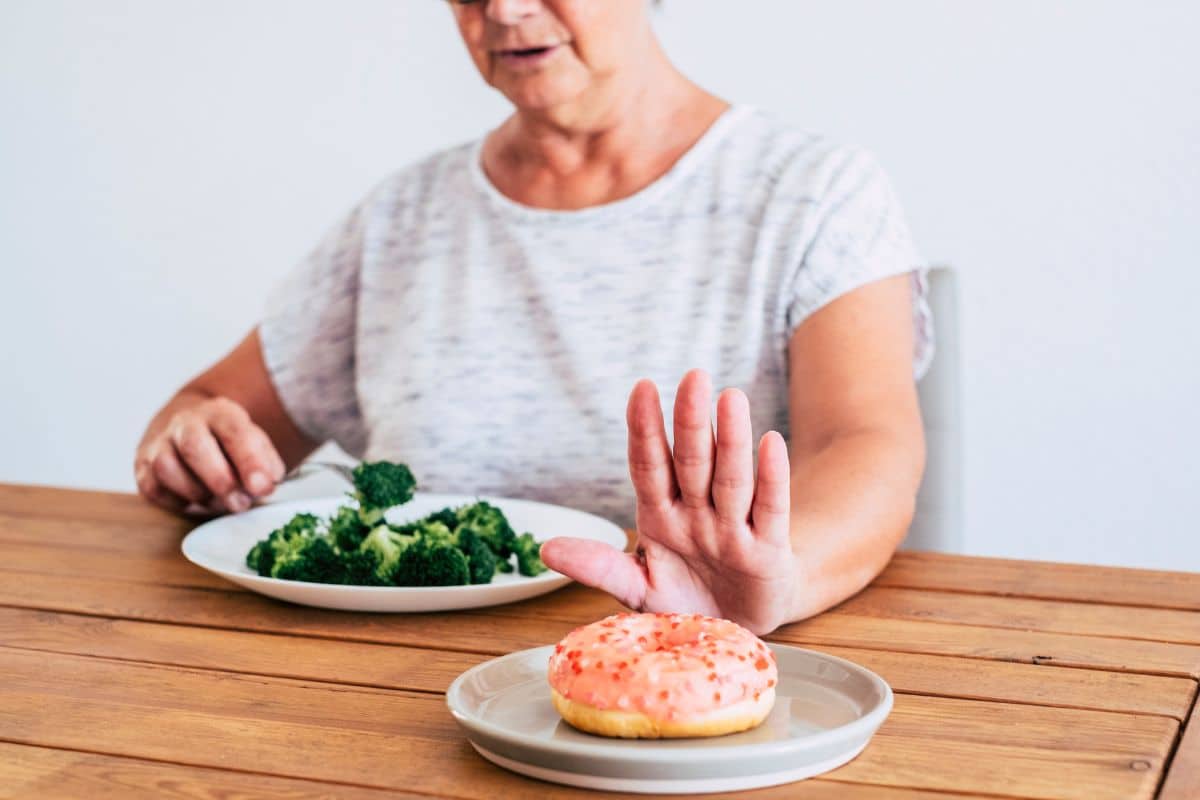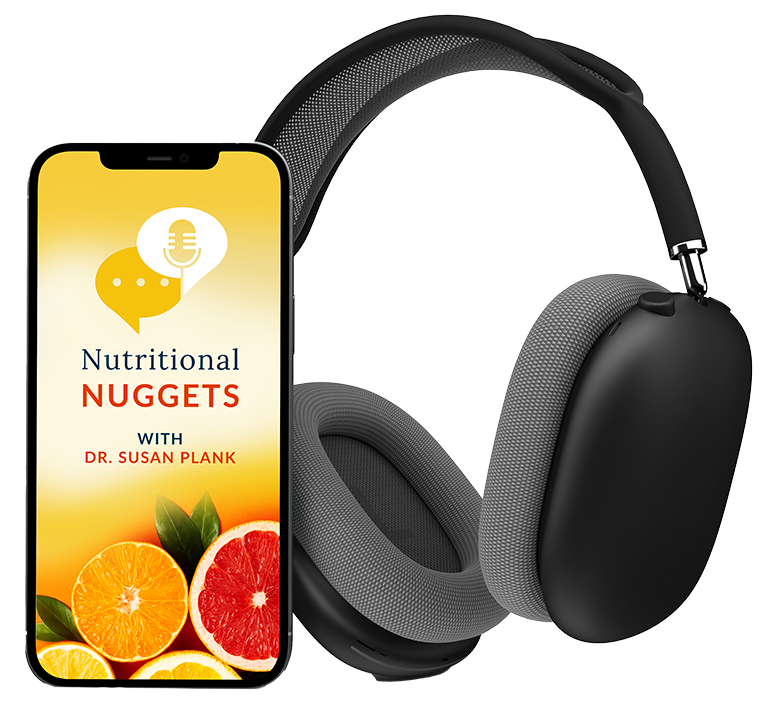We’re kicking off a sweet-free challenge to help you kick your sugar habit. Whether you want to lose weight, boost your energy, or just feel better overall, join us on this 14-day lifestyle change…all online and free!
The science behind sugar addiction is complex
Sugar cravings and addiction involve several physiological and psychological factors. Here are some of the key reasons why it’s so hard to quit sugar:
- Dopamine release: Sugar triggers the release of dopamine, a neurotransmitter that’s associated with pleasure and reward in the brain. When you consume sugar, your brain releases dopamine, which makes you feel good and reinforces the behavior of eating sugar. Over time, your brain becomes desensitized to dopamine, and you need to consume more sugar to experience the same pleasurable effects.
- Habit formation: Like any habit, consuming sugar can become automatic and ingrained over time. Your brain forms neural pathways that associate certain behaviors or situations with consuming sugar, making it difficult to break the habit.
- Emotional eating: Many people turn to sugar as a way to cope with stress, anxiety, or other negative emotions. Sugar can provide a temporary mood boost and distraction from negative feelings, making it a tempting option for emotional eaters.
- Gut-brain connection: Your gut and brain are connected through a complex network of nerves and hormones. When you consume sugar, it can disrupt the balance of bacteria in your gut and lead to changes in your mood and behavior.
- Withdrawal symptoms: When you try to quit sugar, you may experience withdrawal symptoms like headaches, fatigue, and cravings. These symptoms can be difficult to manage and make it challenging to stick to a sugar-free diet.
Overall, the combination of dopamine release, habit formation, emotional eating, gut-brain connection, and withdrawal symptoms make it challenging to quit sugar and break the cycle of sugar addiction. However, with patience, perseverance, and support, it’s possible to overcome sugar addiction and establish healthier eating habits.
Let’s do a deeper dive into our dependence on sugar and sugar addiction.
Why is sugar so hard to quit?
Sugar addiction is a complex topic that has been studied extensively by researchers in recent years. The science behind sugar addiction suggests that it is a result of several factors, including the way sugar affects the brain and body, as well as psychological and environmental factors.
When we consume sugar, our brain releases dopamine, a neurotransmitter that is associated with pleasure and reward. This creates a positive association between sugar and feeling good. To repeat this “reward feeling” and have more feel-good dopamine released- we eat more sugar. This cycle can lead to cravings and addiction. In fact, studies have shown that sugar can be as addictive as drugs like cocaine and heroin.
Additionally, sugar consumption can lead to a rapid spike in blood sugar levels, followed by a crash. The blood sugar high or spike, feels great, you have energy, your brain has power- what’s not to love?
But after each spike in blood sugar is a drop, leading to low energy, mental sluggishness, sleepiness and after lunch tiredness. This cycle can cause feelings of fatigue and hunger, leading to a desire for more sugar. You may find yourself reaching for a pick-me-up cup of coffee, a cigarette or a sugary treat. Over time, this can contribute to weight gain, insulin resistance, and other health problems.
Psychological and environmental factors can also play a role in sugar addiction. For example, stress, anxiety, and depression can lead to cravings for comfort foods like sugary snacks. In addition, our food environment is filled with highly processed foods that are often high in sugar, making them difficult to avoid.
Quitting sugar can be challenging due to these complex factors. It requires both a physical and psychological approach, including reducing sugar intake, finding healthy alternatives, and addressing any underlying emotional issues that may be driving cravings. With time and effort, it is possible to overcome sugar addiction and establish a healthier relationship with food.

What is the impact of sugar on my health?
Sugar can have a significant impact on your health and metabolism in several ways, including weight gain, hormone imbalances, sleep disruption, and an increased risk of developing type 2 diabetes.
- Weight gain: Consuming too much sugar can lead to weight gain, as excess sugar is stored in the body as fat. In addition, sugar can contribute to an increased appetite, making it more difficult to control food intake.
- Hormones: Eating a diet high in sugar can disrupt hormonal balance in the body, particularly insulin, which is responsible for regulating blood sugar levels. This can lead to insulin resistance, a condition in which the body becomes less responsive to insulin, increasing the risk of type 2 diabetes.
- Sleep: Consuming sugar, particularly in the evening, can disrupt sleep patterns. Sugar can cause a spike in blood sugar levels, followed by a crash, which can interfere with the body’s natural sleep rhythms. In addition, sugar consumption can lead to increased anxiety and agitation, further disrupting sleep.
- Diabetes: A diet high in sugar can increase the risk of developing type 2 diabetes. When we eat sugar, the body releases insulin to help regulate blood sugar levels. Over time, excess sugar intake can cause the body to become less responsive to insulin, leading to insulin resistance and eventually type 2 diabetes.
What are healthier sugar alternatives: what should I use instead of refined sugar?
There are several healthier sugar alternatives that you can use instead of refined sugar, including:
- Honey: Honey is a natural sweetener that is rich in antioxidants and has anti-inflammatory properties. It is also lower on the glycemic index than refined sugar, meaning it doesn’t cause a spike in blood sugar levels.
- Maple syrup: Maple syrup is another natural sweetener that is lower on the glycemic index than refined sugar. It also contains vitamins and minerals, including zinc and manganese.
- Coconut sugar: Coconut sugar is a natural sweetener made from the sap of coconut trees. It is lower on the glycemic index than refined sugar and contains small amounts of vitamins and minerals, including iron and zinc.
- Stevia: Stevia is a plant-based sweetener that is much sweeter than sugar, so you only need a small amount to achieve the desired level of sweetness. It is also calorie-free and doesn’t cause a spike in blood sugar levels.
- Fruit: Fresh or dried fruits can be used as a natural sweetener in recipes. They are rich in fiber, vitamins, and minerals, and can add a delicious natural sweetness to baked goods and desserts
It’s important to remember that even though these are “natural” forms of sugar, any sugar can affect your energy, insulin, and blood sugar levels. Sugar has a cumulative effect.
Why should I consider doing Dr. Plank’s Sweet Freedom: 14-day Sugar Detox Challenge?
There are several reasons why you might consider doing a sugar detox:
- Reduce sugar cravings: Consuming sugar can create a cycle of cravings, leading to a desire for more sugar. Doing a sugar detox can help break this cycle and reduce sugar cravings.
- Improve energy levels: Sugar can cause a quick spike in energy levels, followed by a crash, leaving you feeling tired and sluggish. A sugar detox can help regulate blood sugar levels, leading to more sustained energy throughout the day.
- Support weight loss: Consuming too much sugar can contribute to weight gain. By reducing sugar intake, a sugar detox can support weight loss goals.
- Improve overall health: Excess sugar consumption can lead to a range of health issues, including insulin resistance, type 2 diabetes, and heart disease. A sugar detox can help reduce the risk of these conditions and improve overall health.
- Reset taste buds: Consuming a lot of sugar can desensitize taste buds, making it harder to appreciate the natural sweetness of whole, nutrient-dense foods.
Doing a sugar detox can help reset taste buds and make it easier to enjoy healthy, whole foods.
It’s important to remember that my Sweet Freedom: 14-Day Sugar Detox will not be a quick fix. It’s exactly why I have it paired with a healthy eating plan and am giving you delicious healthy recipes to make sure you are eating nutritiously while depending less on sugar.
I’ve tried to cut sugar before. How should I cope with sugar cravings, what are some tips for managing sugar withdrawal symptoms?

Here are some tips for coping with sugar cravings and managing withdrawal symptoms:
- Stay hydrated: Drinking plenty of water can help reduce sugar cravings and keep the body hydrated, which can help manage withdrawal symptoms.
- Eat protein and healthy fats: Protein and healthy fats can help keep you feeling full and satisfied, reducing the desire for sugary foods. Incorporate foods like nuts, seeds, avocado, and lean protein sources into your meals and snacks.
- Eat fiber-rich foods: Fiber can help regulate blood sugar levels and reduce cravings. Incorporate foods like fruits, vegetables, whole grains, and legumes into your diet.
- Get enough sleep: Lack of sleep can increase sugar cravings and disrupt hormonal balance in the body. Aim for 7-8 hours of sleep each night.
- Practice stress-reducing techniques: Stress can increase sugar cravings and make it harder to manage withdrawal symptoms. Practice stress-reducing techniques like meditation, deep breathing, or yoga.
- Have healthy snacks on hand: Having healthy snacks on hand can help prevent reaching for sugary snacks when cravings strike. Try snacks like sliced veggies with hummus, fruit with nut butter, or a handful of nuts.
- Be patient: Withdrawal symptoms from sugar can be uncomfortable, but they will typically improve within a few days to a week. Be patient with yourself and know that the discomfort will pass.
I have healthy low-no sugar recipes built into the Sweet Freedom Sugar Detox. It’s important to be prepared for sugar cravings and have nutritious snacks on hand. It’s equally important to be patient and kind to yourself. Eating low sugar might be new to you, and with any new endeavor, it will take some time for you to become aware of your body’s signals and what food works best to replace a sugar craving.
I want you to learn to listen to your body and not deprive yourself of all sweetness. Incorporating small amounts of natural sweeteners like honey or maple syrup can be part of a healthy, balanced diet.
How do I know when I’m eating sugar, how can I spot hidden sources of sugar?
This is a great question. In Sweet Freedom, we will have multiple daily micro-courses regarding spotting and identifying hidden sugars.
Keep in mind, sugar can be hidden in many processed foods under different names, most sources of sugar listed as ingredients on labels end in “-ose.” Knowing this you’ll be able to spot other sugars quickly.
We’ll be looking at how to read a food label in the detox but the following are some common names for sugar that you may find on food labels:
- High-fructose corn syrup
- Dextrose
- Fructose
- Glucose
- Maltose
- Sucrose
- Corn syrup
I’m really looking forward to Sweet Freedom Sugar Detox but how will I maintain a low-sugar diet after the challenge and truly make sustainable lifestyle changes for long-term success?
Congratulations on signing up for the Sweet Freedom Sugar Detox challenge! Here are some tips for maintaining a low-sugar diet and making sustainable lifestyle changes for long-term success:
- Make gradual changes: Rather than completely eliminating all sugar from your diet, make gradual changes over time. For example, start by cutting out sugary drinks and processed snacks, and then gradually reduce added sugar in other areas of your diet.
- Focus on whole, nutrient-dense foods: Eating a diet rich in fiber, vegetables, whole grains, and lean proteins can help keep you feeling full and satisfied, reducing the desire for sugary foods.
- Experiment with healthy substitutes: Instead of reaching for sugary snacks, try experimenting with healthy substitutes like fruit, nuts, or dark chocolate.
There are also many low-sugar sweeteners available, such as stevia or monk fruit, that can be used in moderation.
- Plan ahead: Planning your meals and snacks ahead of time can help prevent reaching for sugary foods when hunger strikes. Keep healthy snacks on hand and plan meals that are balanced and satisfying.
- Practice mindful eating: Paying attention to hunger cues and eating slowly can help prevent overeating and reduce the desire for sugary foods.
- Seek support: Surround yourself with supportive friends and family who understand your goals and can help keep you accountable.
It’s important to remember that taking back control over sugar is just one step to reclaiming your health, but a very important step.
It’s never too late to say bye-bye sugar. See you at Sweet Freedom: 14-Day Sweet Free Sugar Detox Challenge!
There’s still time, Register Now!







